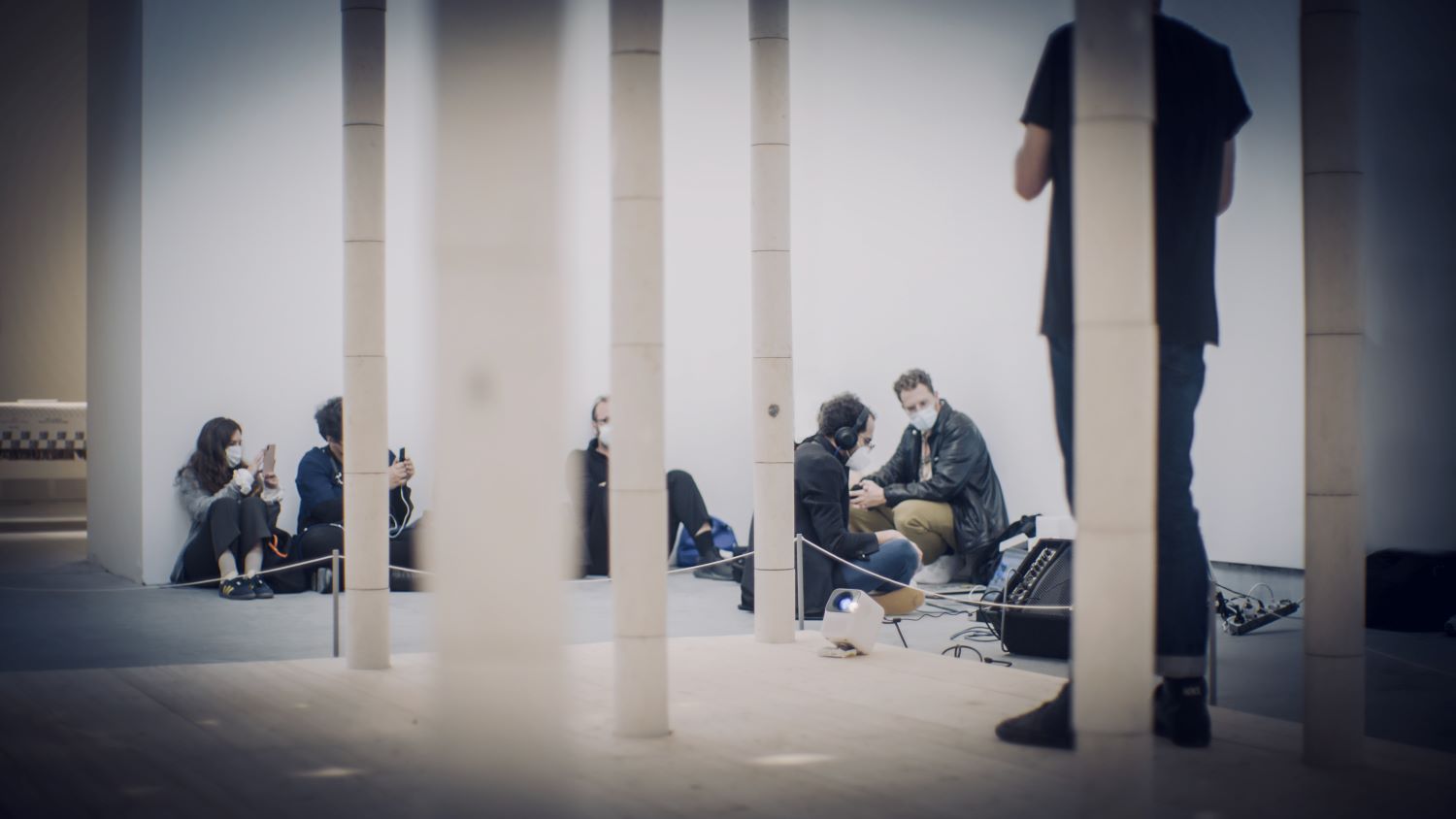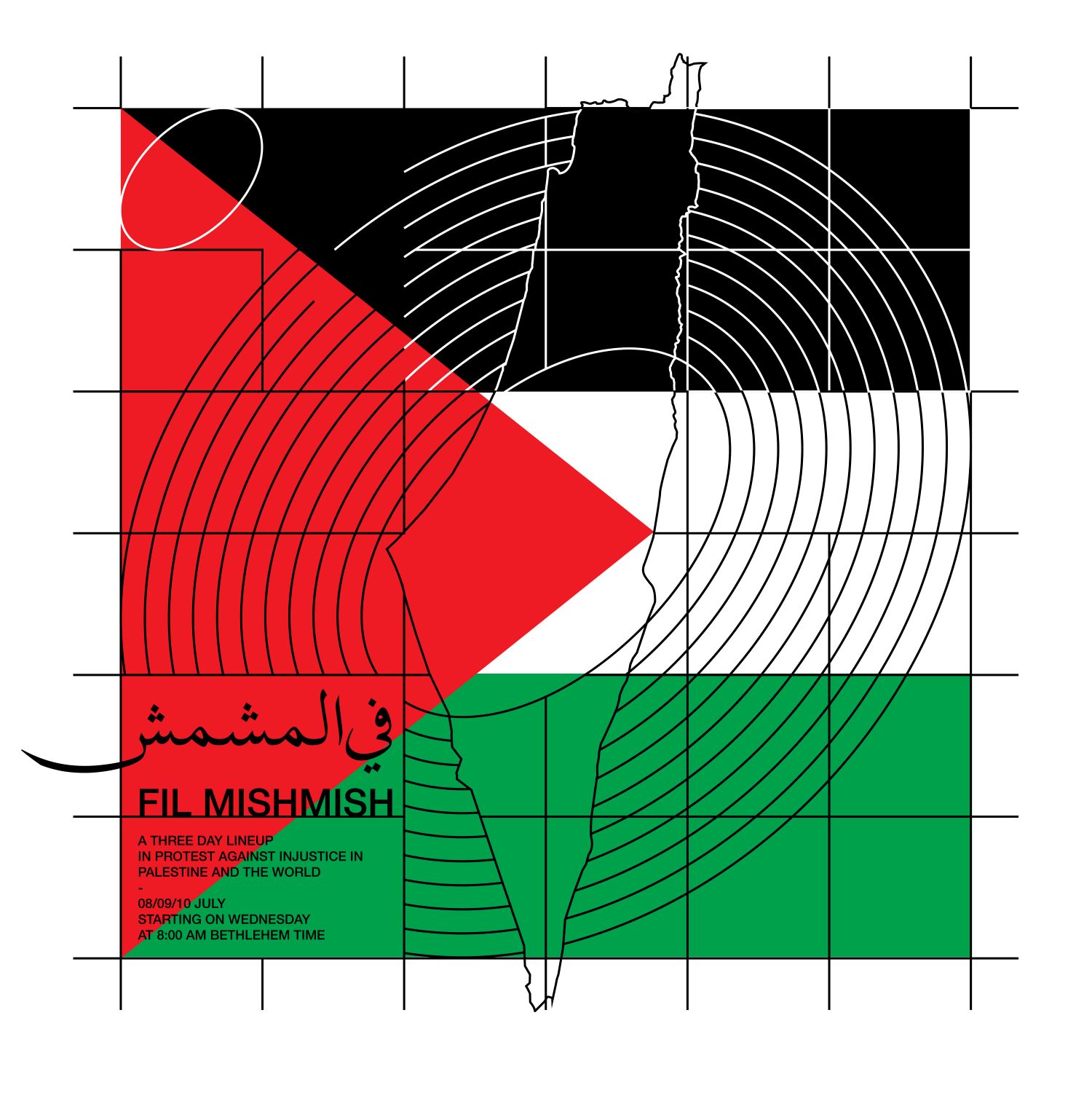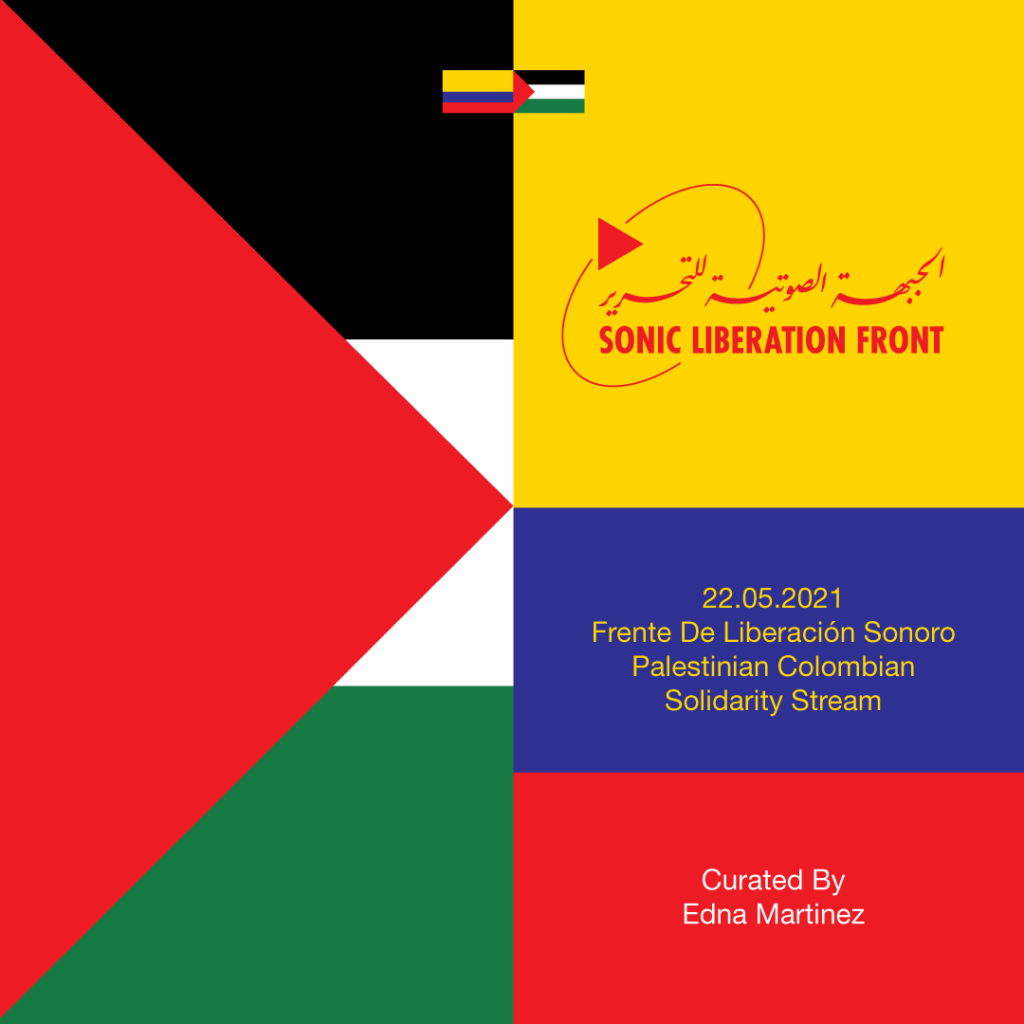THE LONG READ: How Palestine’s Radio Alhara is taking a grassroots approach to shaping a new landscape for protest, culture and local journalism online.
Hunched down in front of a DJ console, Yousef Anastas assiduously manages the decks, preparing the mix and adjusting the atmospherics of the ambient track he is playing. It is haunting and trance-like: the drone-like synthesiser he has programmed melds into the repeated strumming of an oud – a Middle Eastern stringed instrument – with increasing intensity. It feels as if it is urgently attempting to break free within the mix. It seems like an apt sonic metaphor for life in the 33-year-old’s native Palestine.
Yousef is performing this set together with several other Middle East-based DJs for Sonic Liberation Front, a months-long broadcast intended as a collective artistic show of support for Palestinian liberation.
Although they perform without a physical audience, the stream is being listened to by hundreds of people at once, being aired on Radio Alhara, the Palestine-based online radio station set up by Yousef, his brother Elias, and a group of international friends, which has quietly risen to become one of the most formidable online radio presences – and with it, one of the biggest voices for Palestinian liberation – in the world.
During the pandemic, the group found themselves overwhelmed by the offerings of cultural institutions worldwide, which were focused on opening up their archives to the public. Seeking a grassroots, crowdsourced alternative, the Radio Alhara co-founders decided to build their own version of a community archive by commissioning hour-long broadcasts produced by fellow members of the cultural community.
People who tuned in to Radio Alhara were seeing parallels between the injustices in Palestine and other forms of oppression worldwide, including in their own corners of the world
They approached Yamakan, a Beirut-based initiative formed to help people within the Middle East and North Africa region set up their own radio stations. Established by the founders of Radio al Hai, a Lebanese online radio station set up earlier in the pandemic, the initiative is styled on the pirate radio stations that operate without official licenses from broadcasting authorities.
The initiative proved to be a match for the group behind Radio Alhara, who were concerned with maintaining the station’s creative independence, as well as its ability to foster a cultural community that wasn’t beholden to corporate interests or the need for donors. Like pirate radio, Yamakan’s stations, including Radio Alhara, are community enterprises characterised by high voluntary participation, operation at little to no cost and without fear of regulatory censorship. “It has been very interesting to think of [Radio Alhara as] a new form of cultural centre,” said Elias.
Local community – on an international level
Inspired by the community that has formed around stations like Radio al Hai, the co-founders settled on the name “Hara”, which means “neighbourhood” in Arabic. “The neighbourhood is a space defined by the people who live [within it], and they make it become more detailed,” explained Elias. “It’s a space governed by its inhabitants and its users.”
The result of this vibrant neighbourhood – which Yazan refers to as a collective of “cultural producers” – is that shows about niche music harmoniously occupy the same schedule as conversations with academics, chefs, and activists alike.
That this community has gathered around Palestine, a state whose colonisation by Israel weighs daily on the five million people who live under increasing restrictions in both Gaza and the West Bank, makes it unsurprising that many of the station’s broadcasts contain an anti-imperialist flavour.
On a Sunday in June, an hour of jazz from the 1960s selected by Berlin-based record label manager Dimitra Zina is followed by a discussion between researchers Nora Akawi and Khyam Allami on challenging the Western biases inherent in music production software. The following Friday, shows flitted from an hour of Barcelonan minimal techno to a reading of works by the Tuareg novelist, Ibrahim Al-Koni.

‘A new form of cultural centre’
Radio Alhara wasn’t always meant to be so overtly political. Set up during the first wave of the coronavirus pandemic in March 2020, the station was initially formed as a way for the station co-founders – five creatives active within the Palestinian cultural sphere – to broadcast daily radio shows online according to their mood on a particular day of isolation. “At the beginning, it was just kind of a joke platform where all of us exchange music, and invite friends to share [music] libraries,” recounted Elias over a video call.
The co-founders of Radio Alhara met both on the dance floor and through their various professions. The close-knit cultural and music community of Palestine was where Elias and Yousef – who are both architects and run an architectural practice together – met 40-year-old Yazan Khalil, who formerly ran the Khalil Sakakini Center, an arts and cultural institution in Ramallah. In Amman, graphic designers Saeed Abu Jaber, 36, and Mothanna Hussein, 34, met sound designer Ibrahim Owais, 38, through Owais’s regular appearances at the parties they organised. It was the exhibiting of chairs designed by Elias and Yousef at Saeed and Mothanna’s design studio that launched the co-founders’ friendship and eventual formation of the station.
In New Orleans in the 1910s, jazz was the language of resistance for African Americans. In the same tradition, the music of Palestine, through Radio Alhara, declares itself a space for resistance against political oppression
The social space of music and dancing has historically been a site of sociopolitical resistance. In New Orleans in the 1910s, for instance, jazz was the language of resistance for African Americans, who used music to collectively build a culture and movement in spite of attempts to suppress it. In the same tradition, the music and cultural community of Palestine, through Radio Alhara, declares itself a space for resistance against political oppression and tyranny, where they are free despite the increasing restrictions they face simply for being Palestinians. Symbolically, that same jazz, music from the likes of Dizzy Gillespie and Louis Armstrong, is heard regularly on the station.
Radio Alhara’s rapid growth as a cultural beacon of Palestine mirrors the dramatic ascent of the state’s music scene on a global stage. In 2018, the techno DJ, Sama’ Abdulhadi, performed a set on streaming platform Boiler Room to critical acclaim, one that has been viewed over 8.5 million times. The rooftops of Palestinian office blocks where parties such as Abdulhadi’s are often held may have been empty during the pandemic, but these online endeavours have kept the spirit alive.
‘Tomorrow, when the apricots bloom’
Just months into initial operations at Radio Alhara last July, the station found itself turning its focus entirely to Palestinian liberation with a week-long marathon broadcast they called, “Fil Mishmish” – Arabic that roughly translates to “tomorrow, when the apricots bloom” – a sonic protest against proposed plans by Israel to annex parts of the West Bank last July. The phrase, which is used to mean “wishful thinking”, or something that may never happen, has its roots in the apricot-picking season, which falls on only two weeks of the year. It expresses the frustration that freedom is hard-fought and far from being achieved.
“We were thinking, what kind of response can we bring to the Israeli plan which was totally unilateral and illegal?” said Elias. The co-founders took the station off air for a day to organise a response and to illustrate the gravity of the situation to their listeners worldwide. They started by inviting listeners to come together to submit their voices of resistance in an online, sound-based protest. Initially planned as a 24-hour broadcast, they received such a huge outpouring of solidarity that they ended up broadcasting all the material they received across five full days.
People who broadcast and tuned in to Radio Alhara alike, the co-founders noticed, were seeing parallels between the injustices they saw happening in Palestine and other forms of oppression worldwide, including in their own corners of the world.
One day at the end of June, Radio Alhara broadcast a series of programmes by South African DJs and artists in an international show of solidarity, with the guiding principle being that they, like Palestinians, have experienced the effects of apartheid and continue their resistance against it. “From the youth of 1976 [of the Soweto Student Uprising] with nothing but stones to defend themselves, to those in the West Bank, we send love,” they said in their show’s introduction, expressing the notion that pursuits of freedom are historically linked.

Such solidarity is at the core of Radio Alhara’s Sonic Liberation Front, a series of daily broadcasts following on from Fil Mishmish that have been continuing since May this year. This latest orchestrated sonic protest was sparked by Israel’s escalation of violence against Palestinians that has seen the sacred Al-Aqsa Mosque stormed by Israeli troops during the holy month of Ramadan, the forced evictions of Palestinian residents in the Sheikh Jarrah neighbourhood of East Jerusalem, and an 11-day aerial bombardment of Gaza, which left more than 230 Palestinians dead and destroyed the offices of media organisations there, including those of Al Jazeera.
Against this backdrop, Sonic Liberation Front becomes emblematic of not a short-term struggle that briefly captured international attention, but rather, one that is perennial. “Our life is not affected by a conflict, it is affected by the aggression of a settler colonial state,” said Elias. “The most recent events happened in Sheikh Jarrah in Jerusalem and in Gaza. But these have always been recent to us. In fact, they have never ceased to be and in that sense they affect our daily lives.”
The plight of Palestine – highlighted in no small part by grassroots movements such as Radio Alhara’s – has gained attention worldwide this year. In May, marches in London in support of Palestine were estimated to have attracted 180,000 people across several weekends. In the same month, the Republic of Ireland became the first Western nation to unilaterally condemn Israel’s de facto annexation of Palestinian land.
‘Media content about Palestine is very compromised’
Worldwide, online radio is a relatively new phenomenon. A handful of streaming stations have sprung up in the last decade, with the pandemic prompting a new burst of at-home broadcasting studios. For many stations, social media, particularly Instagram, has been a key platform for regular engagement with the rest of the global musician, DJ and listener community.
Radio Alhara itself has risen to become one of this community’s biggest online presences with over 40,000 followers on the social media site, to whom they broadcast everything from historical photographs, to daily show schedules and artwork created by station co-founders, Amman-based graphic designers Mothanna and Saeed.
As truth is obscured about the situation in Palestine, and misrepresentations of violence proliferate, Radio Alhara has emerged with its use of culture, music and art to form an alternative media network
Yet this close relationship with social media is conflicting for the co-founders of Radio Alhara, who lament the restrictive censorship of platforms such as Facebook, Instagram and TikTok, whose moderation algorithms have been reported to remove pro-Palestinian content.
“Content [about Palestine] is very compromised not just in mainstream media, but also in lots of social media and algorithms attempt to deeply censor Palestinian content,” said Yazan.
Among the radio team, and more widely in Palestine, there has been significant frustration about the censorship on social media sites of footage showing evidence of the oppression of Palestinians. In May, Palestinians widely reported that posts, particularly from activists raising awareness of protests happening in the state, with hashtags such as #AlAqsa, had been routinely deleted by the sites.
In a report titled, The Attacks on Palestinian Digital Rights, Palestinian digital rights group 7amleh accused social media companies of working with Israeli authorities to censor posts documenting illegal Israeli aggression towards Palestinians, while at the same time allowing hate speech directed towards Palestinians and Arabs to remain online.
“There is close cooperation between social media companies and the Israeli government, which abuse this and try to silence the voices speaking out against the Israeli occupation,” Nadim Nashif, the director of 7amleh, told Al Jazeera in May.

As truth is obscured about the situation in Palestine, and misrepresentations of violence proliferate, Radio Alhara has emerged with its use of culture, music, art, and their confluence to form an alternative media network. “What we’re doing is creating a platform that people engage with, but [that] is outside of the mainstream media and algorithm’s censorship,” said Yousef.
The power of online radio
To raise awareness of their broadcasts and, through those, awareness of what is happening in Palestine, the station relies on a network of radio stations worldwide that Elias describes as a form of “structural solidarity”. Radio Alhara’s sister stations, which include independent online stations from almost every continent, take turns to simultaneously broadcast the station’s daily programming to help them reach a wider global audience, maximising listenership through a domino effect. “You have content beginning to reach people who wouldn’t otherwise have been able to discover it,” said Saeed.
The station’s visibility has also been helped by the artistic support and presence of pro-Palestinian DJs and musicians. The Chilean-American musician and composer, Nicolas Jaar, contributed to Sonic Liberation Front by performing unreleased compositions while reciting a live monologue about how inequality of water access has been a key means of segregation in Palestine and Israel. Jaar’s popularity as a musician, Elias notes, drew fans who might not have been clued up on the situation in Palestine to his broadcast, “so using the vector of culture and music to target various and diverse audiences [with the message of resistance] works,” he says.
As Radio Alhara grows in popularity, its sense of defiance reverberates throughout the world
Radio Alhara’s hybridisation of culture, music and art has also converged in the physical world, through the Anastas brothers’ architectural practice, AAU Anastas. Featured in the Venice Architecture Biennale this year, their installation, All Purpose, questioned the imperialistic notion that the practice of stonemasonry is one of European origin. On its opening night, the artists and Radio Alhara residents, Lawrence Abu Hamdan and Moe Choucair – who performs under the name Bakisa – performed soundscapes blending field recordings from the streets of Gaza and Jerusalem with an opera piece. The two sounds are filtered through various digital effects until they were unrecognisable – a reflection of the continuous battering of Gaza and the West Bank by Israeli aggression.
As Radio Alhara grows in popularity, its sense of defiance reverberates throughout the world. On a Friday night in July – the first since all COVID restrictions were relaxed in the UK – Radio Alhara held a club night in the East London music venue and bar, the Servant Jazz Quarters, which was also broadcast live as part of Sonic Liberation Front.
It was the first of many planned in-person gatherings of Radio Alhara’s residents and listeners around the world. Radio Alhara resident DJs deftly mixed a free range of music from jazz to funk to French disco for an enthusiastic crowd. The “Hara” ethos of the station was on display: the ability of the station’s residents to play anything they wish, in a neighbourhood that fervently encourages such freedom. These parties are poignant metaphors for a dream that the same kinds of freedoms will one day be attained for Palestine.
This article first appeared on Al Jazeera







































